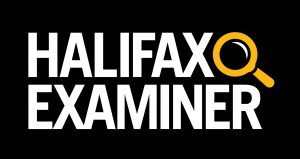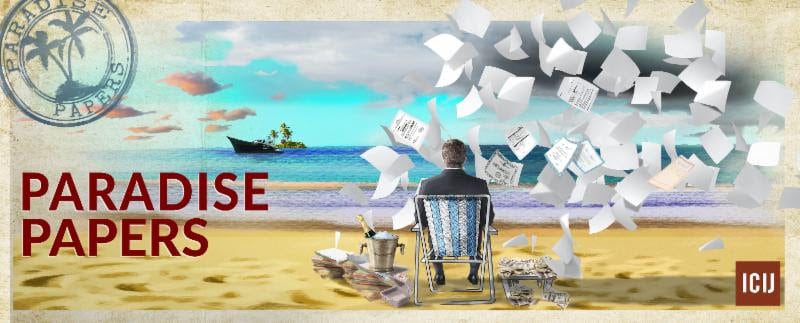This article originally appeared in the Halifax Examiner on November 14, 2017.
Quick now. What has the Canadian Taxpayers’ Federation (“a citizens’ advocacy group dedicated to lower taxes, less waste and accountable government”) had to say about all those revelations of tax-sucking, financial jiggery-pokery uncovered in the Paradise Papers?
Sorry. Time’s up.
You win.
Nothing. They’ve said nothing.
We’ll come back to that.
On November 5, 2017, the International Consortium of Investigative Journalists and its 95 media partners around the world began releasing the juicy fruits of an 11-month, 380-reporter, six-continent, 30-language investigation into 13.4 million leaked documents from the files of Appleby, a Bermuda-based, globally focused “offshore services” law firm, and Asiaciti, a Singapore-based family-owned trust company specializing in tax havens.
The reporters wanted to know what that mountain of documents might reveal about how the richest and most powerful individuals and companies in the world use tax havens and complicated corporate shell games to move money around while avoiding paying their fair share of taxes in their real home countries.
The short answer: more than you could imagine.
In fact, it was hard to keep up with last week’s Niagara Falls of iconic names — the Queen, Prince Charles, members of Donald Trump’s cabinet, Vladimir Putin’s son-in-law, Apple, Nike, Bono, Shakira, Madonna, Justin Timberlake — that kept tumbling out of news stories naming them as creators of, investors in, or beneficiaries from companies whose primary purpose was to lower or eliminate taxes they would otherwise owe.
According to the CBC — one of two Canadian partners in the journalists’ consortium — “more than 3,000 Canadian companies and individuals” popped up in the Paradise Papers too: from former prime ministers Jean Chretien and Paul Martin to current Prime Minister Justin Trudeau’s chief fundraiser Stephen Bronfman, and all the way down to the previously unknown Julian Lavallée, a twentysomething “botmaster” ticket scalper in Quebec who grossed $7.9-million in 2016 by buying and upselling tickets to concerts and sporting events, the profits of which he appears to have then invested offshore. Not to forget all those companies whose very names seem to shout “Canada” — the Montreal Canadiens, Maple Leaf Foods, Petro-Canada, Loblaws, the Dare in Care’s Cookies — but whose financial advisors must have whispered “Cayman Islands” and other tax-free blandishments in their eager ears.
The first reality — as most of the stories, and all of the shocked-and-appalled, “we-are-in-full-compliance-with-the law” statements by those named quickly acknowledge — is that most of what those individuals and companies did is probably legal.
That’s not the solution but the problem, and one reason why we should take Justin Trudeau’s solemn declaration last week —the Canada Revenue Agency is “reviewing links to Canadian entities [named in the Paradise Papers] and will take every appropriate action . . . . We will continue to work for a system that is fair” — with a heaping dollop of winter road salt
The second reality is that tax reform with the goal of tax fairness has no powerful lobby behind it. Tax havens do.
Examples?
According to another CBC story last week — also gleaned from Paradise records — a Montreal law firm that represented prominent Liberal/Paradise Papers-connected clients, acted as a “leading player,” carrying “the torch” in several successful lobbying campaigns to block effective offshore tax reform legislation in Canada during the last 20 years.
Given the global nature of the tax haven business, of course, real reform will ultimately require collective action involving many countries. In 2013, then British Prime Minister David Cameron, reeling from revelations of “over-aggressive tax avoidance and evasion” in his own country, did propose a few measures to increase financial transparency. They were to be discussed at an upcoming G8 meeting.
Canada, at first, seemed to be on board: “This is a very important initiative by Prime Minister Cameron,” declared then-Canadian prime minister Stephen Harper. “It is important that we do it and that we do it together.” But then, as the CBC reports, the lawyer-lobbyists and the tame federal finance bureaucrats began to pelt sand in the gears. Thanks in part to Canada, the final G8 agreement was so watered down the lobbyists were able to high-five their victory and quickly get back to their real business of creating and expanding offshore tax havens.
Officially, offshore tax havens cost Canada’s treasury from offshore tax havens $6-8-billion a year, but the real number is probably much higher.
So who really speaks for Canadian taxpayers who must pay the price for this tax avoidance by the rich and powerful in the form of higher taxes and poorer services?
Certainly not the misnamed Canadian Taxpayers’ Federation. It is currently busy winning its word war to prevent Ottawa from closing any of the various loopholes that allow incorporated so-called small businesses to drive a Mack Truck though the notion their owners should pay their fair share of taxes.
So far as I can tell, the CTF has not uttered even a single shocked-and-appalled tweet about the revelations in the Paradise Papers, or demanded Ottawa begin collecting all those billions in lost revenue.
So who does the Canadian Taxpayers’ Federation really represent? Who are its members? Who funds it… really? And, while we’re asking, why do its spokespeople always pop up in the mainstream media pretending to speak for Canadian taxpayers — while ignoring their real interests?
As Marco Chown Oved, one of the Paradise Papers reporters at the Toronto Star — the other Canadian member of the consortium — put it: “The problem is that billions of dollars in taxes from the wealthy and corporations aren’t being collected because of tax havens. And those billions for schools, hospitals and roads have to come from somewhere, so everyone else has to pay more… Think of what that money could pay for and ask yourself why more people don’t care.”
Good question. Just don’t expect an answer from the Canadian Taxpayers’ Federation.
***
After this column was published, Kevin Lacey, the Atlantic Director of the Canadian Taxpayers’ Foundation, tweeted that he did refer to the Paradise Papers after they were released. His tepid tweet — “Yes, let’s review our tax system and make sure it works for average workers, not just those at the top” — linked to a Halifax Today article. The article quotes Lacey saying: “You can put the tax rate to whatever you want for wealthy individuals and they will find a way to not pay them.”
While I do apologize to Lacey for missing his tweet (I searched “Canadian Taxpayers Federation” in the Google news feed, and looked at both the CTF home page and its Twitter feed, and found no references to CTF commenting on the Paradise Papers in any of those likely locations), I think it’s fair to note the Canadian Taxpayers Federation’s recent campaigns against small business tax reform — which most independent economists note would have little impact on actual small businesses but would impact wealthy individuals using incorporated small businesses to avoid taxes — shows its true colours.






 STEPHEN KIMBER, a Professor of Journalism at the University of King's College in Halifax and co-founder of its MFA in Creative Nonfiction Program, is an award-winning writer, editor and broadcaster. He is the author of two novels and eight non-fiction books. Buy his books
STEPHEN KIMBER, a Professor of Journalism at the University of King's College in Halifax and co-founder of its MFA in Creative Nonfiction Program, is an award-winning writer, editor and broadcaster. He is the author of two novels and eight non-fiction books. Buy his books
So is there a more trustworthy group of non partisan experts who keep watch over government misappropriation of funds and waste of taxpayers money?